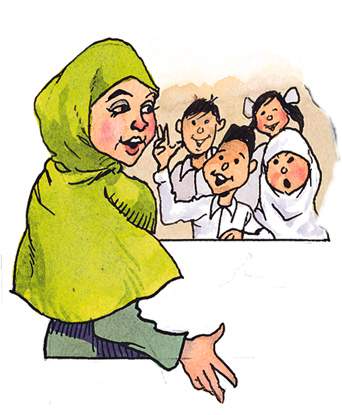
- Who
is
your Lord (Rabb)? Who
created you?
- Allah
- Whose
slave are you?
- I
am the
slave of Allah.
- What
is
your religion?
- My
religion
is ›slam.
- Which
book do you believe in?
- I
believe
in the Holy Quran.
- What
is
Din?
- It
is the set of laws
which guides the sane people who believe with their free will to the
most right, the most beautiful, and everlasting happiness.
- What
is
Islam?
- It is the
name of the last divine religion which was sent to human beings by God
through His Prophet Muhammad?
- What
is
Iman (Belief)?
- It is the
acceptance and
attestation of the decrees which are known in certainty that they are
brought from God by the Prophet.
- What
would be your answer to
someone who asked how many
gods there were?
- I would
answer that there is only one.
- What
is your evidence that there is only one Allah?
- My evidence
is the first verse (ayah) of the Surah allkhlas.
- What
is
the meaning of the verse (ayah)?
- The meaning
is; "Say: He is Allah, the One and Only!"
- What
is
your reasonable evidence that Allah exists?
- The
existence of this universe and the continuation of its system and order.
- Would
it
be right to think about the essence of
Allah?
- No, it
would be improper to think about the essence of Allah because reason is
incapable of understanding it. One can only think about the qualitiea
of Allah.
- What
are
The Divine Attributes of Allah?
- The Divine Attributes of
Allah the
Most High are classified
in two groups: the Divine Attributes of the Being of Allah (al
Sifat al-Dhatiyyah) are six and the immutable of the Divine Essence of
Allah (al-Sifat-al-Thubutiyyah) are eight.
- What
are
the Divine Attributes of the Being of Allah?
- Al-Wujud : He is
the Existing One,
- Al-Qidam : He is
the Pre-Eternal One,
- Al-Baqah : He is
the Everlasting One,
- Al-Wahdaniyyah :
He is the Unique One,
- Al-Mukhalafatun lil
Khawadith : He is Unlike the Created,
- Al-Qiyam bi'nafsihi : He
is the Self-Existing One.
- What
are
the Immutable Attributes of the Divine Essence of Allah?
- Al-Hayat : Hei s
the Living and Resurrecting One,
- Al-Ilm : He is
the All-Knowing One: Allah the Most High knows everything to such an
extent that He even knows the secret intentions of the heart,
- Al-Sami : He is
the All-Hearing One: Allah the Most High hears eveything,
- Al-Baseer : He is
the All-Seeing One: Allah the Most High can see a black ant crawling on
a black rock in the dark of night and He can hear the sound of its
moving limbs,
- Al-Iradhah: He
has Absolute Will: Alalh the Most High has the quality of divine
Determination so that He does whatever He wishes and in whatever
manner He wishes,
- Al-Qudrah : He
is the Omnipotent, the Almighty One, and He has power over all things,
- Al-Qalam : His
manner of Speech is Unique to Him; Alalh the Most High spaeks
without need of letters or souns,
- Al-Taqwin : He is
the Creator from nothing of all things and beings.
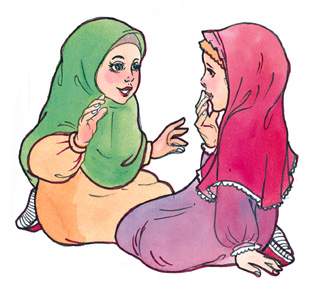
- What
is an
angel?
- An
angel is
created from Divine Light and can take any shape or form. They are
sinless and continually in a state of prayer.
- What are the
names of the four Archangels?
- Gabriel
(a.s.), Michael (a.s.), Raphael (a.s.) and Azrael (a.s.)
- What was
Gabriel charged with?
- He was charged with the
responsibility of
communicating the revelations of the Holy Scriptures of Allah the Most
High to the Prophets (a.s.). This angel acted as the intermediary
between Allah the Most Great and His Prophets by revelation.
- What was
Michael charged with?
- He is
charged with the formation of some natural phenomena such as the wind,
the rain, the snow, and the growth of vegetation.
- What was
Raphael charged with?
- He has
been
charged with the task of blowing the trumpet (al-Thur) on Doomsday
(al-Qiyamah) and again for resurrection of humanity.
- What was
charged with?
- He is
charged with the task of taking the souls at the time of death
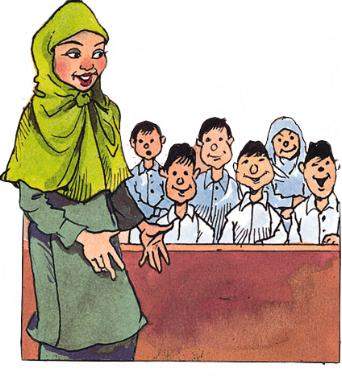
- What
is
Tawhid?
- It
is the belief in God's
existence and His Oneness.
- What
is
Shirk?
- It
means to associate partners with God.
This is done by attaining gods besides Allah and worshipping someone
other than
Him.
- Who is called a
Prophet?
- A an
who is
charged by Allah to communicate the religion of Allah is called a
Prophet.
- How many
Prophets have been sent to man?
- According
to a tradition narrated by our Prophet (s.a.s.) one hundred and twenty
four thousand prophets were appointed. Yet, by another tradition the
number of Prophets is two hundred twenty four thousand.
- How many
Prophets are mentioned in our Holy Qur'an?
- Twenty-eight.
- Would you
please list their names?
- Adam,
Enoch, Noah, Hood, Salih, Abraham, Lot, Ishmael, Isaac, Jacob, Joseph,
Job, Moses, Aaron, David, Solomon, Elijah, Dhulkifl, Jonah, Zachariah,
John, Jesus, Ezra, LoQman, Dhul Qarnain and Muhammad Mustapha, peace
upon them all. some call Ezra, Loqman and Dhul Qarnain (a.s) special
friends of Allah (awliyahs).
- What
ar Nabi or Rasul
- He is a distinguished person
who conveys to people whatever receives from God.
- What are the
names of the four divine books and
which Prophets (a.s) were they sent to?
- The
Torah
to Moses (a.s), the Psalms to David (a.s), the Gospel to Jesusu
(s.a.) and the Holy Qur'an to our Prophet Muhammad Mustapha (s.a.s)
- What are the
written pages (suhuf), how many pages
are there and to whom were they sent?
- There
are a
hundred written pages (suhuf) which Allah sent by the Archangel Gabriel
(a.s) to some prophets. Ten written pages were sent to Adam (a.s),
fifity to Seth, (a.s), thirty to Enoch (a.s), and ten to Abraham (a.s)
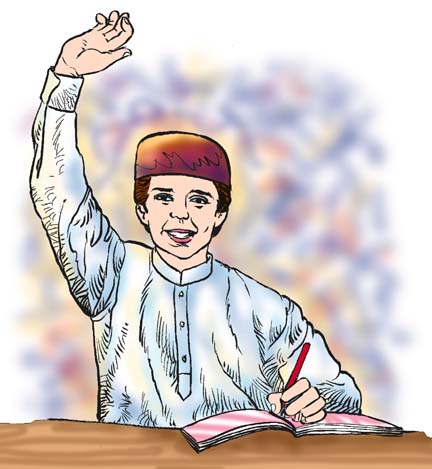
- What
do we call the nights in
which we give particular value to spending it in worship?
- We call them the Blessed
Nights (Qandil)
- How many
Blessed Nights are tehere in a year?
- There are five Blessed Nights
in a
year: Mawlid Night,
Ragaib Night, Miraj Night, Bara'ah Night, Qadir night.
- What is
Mawlid Night?
- It is the celebration of the
Blessed Night when our Prophet
(s.a.s.) was born.
- What is
Ragaib Night?
- It is the celebration of the
Blessed Night when Muhammad's
(s.s.s.) mother Amina understood that she was pregnant with our Prophet
(s.a.s.)
- What is
Miraj Night?
- It is the celebration of the
Blesse Night of the
Prophet Muhammad's (s.a.s.) miraculous journey to Heaven and other
universes by the invitation of Allah.
- What is
Bara'ah Night?
- It is the celebration of the
Sacred
Night when the Holly
Qur'an came to the world from the divine tablet, when the yearly
sustenances andthe life of a man are reviewed and when forgiveness and
blessings are given to all Muslims.
- What is
Qadr Night?
- It is the celebration of the
Sacred
Night when our Holly
Qur'an started word by word to our Prophet Muhammad (s.a.s.)
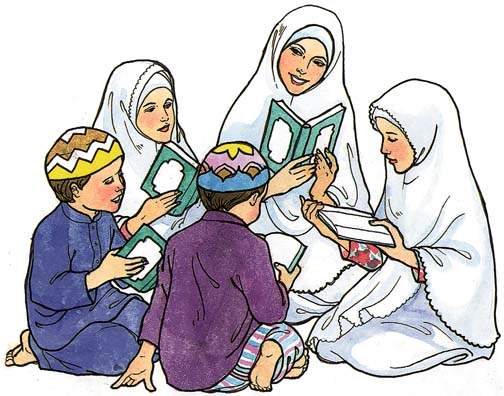
Dawn
Prayer has
four rakahs; two sunnah and then two fardh are performed.
Noon
Prayer has
ten units, four first sunnah, four fardh, two last sunnah are performed.
Late
Afternoon Prayer
is eight rakahs; four sunnah and four fardh are performed.
Sunset
Prayer is
five units; three fardh and two sunnah are performed.
Late
Evening
Prayer
is thirteen units; first four sunnah, then four fardh, then two final
sunnah, and finally three wajib witr. Totally forty units are performed
in a day.
|
- Are
you
a Muslim?
- Thanks be to Allah
(Alhamdulillah), I am a Muslim
- What
does it mean to be a Muslim?
- Knowing
that there is only one Allah, and accepting the Holy Qur'an and Prophet
Muhammed (s.a.s.)
- Since
when have you Muslim?
- I have been
a Muslim since the time of the world (Balaa)
- What
does "Balaa" mean?
- It is a
covenant (mithaq). That is, Allah asked whwn He created all souls: "Am
I not your Lord (Rabb)"? They answered "Yes, for certain you are our
Lord (Rabb) (Balaa)." Thus, I have been a Muslim from that time.
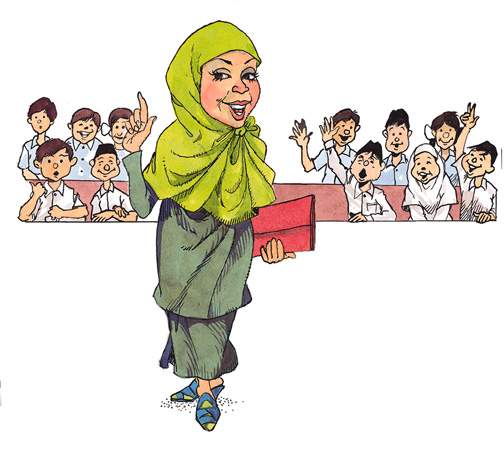
- What
is Fard (Obligatory)?
- It is the thing
which is requested
to be performed in certainty by the religion.
- What
is
Wajib?
- They
are the decrees
which their performance are demanded by the religion with the
presumptive (zannÓ) evidences.
- What
is Sunnat?
- They
are the religious
duties the Prophet performed and demanded to be fulfilled by the
Muslims.
- What
is Hadith?
- They are the verbal
expression of
the utterances or the actions and approvals of the Prophet Muhammad.
- What
is Mubah?
- They
are the
things which performing them or not is permissible in religion.
- What
is Haram (Prohibited)?
- They are
the things which their performance are prohibited with certainty by the
religion.
- What
is
Halal (Lawful)?
- They
are the
things which there is no religious decree for they are to be done or
not.
- What
is
Makruh (Abominable)?
- It
is a thing which its abandonment is demanded by religion by a
presumptive evidence.
- What
is
Mustahab?
- They are the religious actions which the
Prophet performed sometimes and ignored sometimes.
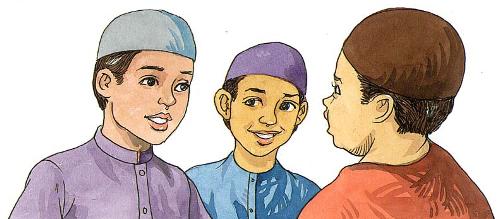
- What is
Sura?
- It
is the each
chapter of Qur'an separated from each other by the Basmala.
- What is
Ayat?
- They
are the sentences and
verses of the Qur’an.
- To
which direction do you turn when worshiping?
- I turn to
the Holy Kaaba in Makkah.
- Whose
community (Ummah) are you from?
- I am from
the Ummah of Muhammad (s.a.s)
- From
whom have you descended?
- I
have
descended from Adam (a.s.)
- Whose
nation are you from?
- I am from
the nation of abraham (Ibrahim) (a.s.)
- What
is a repetance of desperation (Tawba-i Yais)? Is
that kind of repentance acceptable?
- It is the
respentance of a dying man who already has Iman and who has acted
accordingly.Yes, it is
acceptable.
- What
is belief of desperation (Iman-i Yais)? Is
that kind of faith acceptable?
- To accept
Faith as Pharaoh did just at the moment of death.
No.
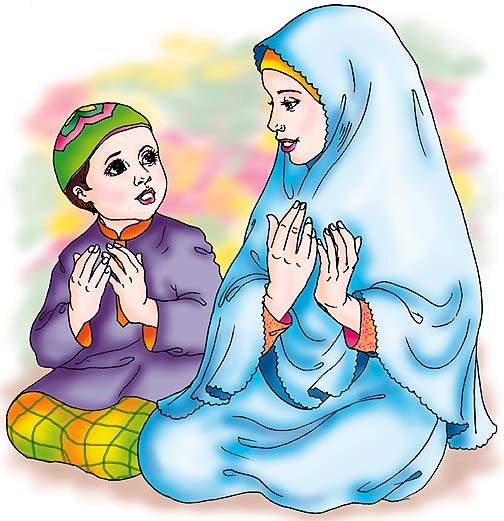
- What
is the name of the father of our Prophet have?
- Abdullah.
- What
is his mother's name?
- Amina.
- What
is his grandfather's name?
- Abdulmuttalib.
- Where
was
our Prophet Muhammad (s.a.s.) born and died, when?
- He
(s.a.s.)
was born in Makkah in 571 C.E. and died in 632 C.E. in Madinah.
- Where
is his tomb?
- He was laid
to rest in his tomb in the Mosque of the Prophet (Rawza al-Mutaharra)
in Madinah.
- How
old was he when he was given the Prophetwood?
- His
prophetwood became a fact when he was 40 years old.
- How
many years did he serve as a Prophet?
- He
performed his prophetic duties for 23 years.
- When
did our Prophet (s.a.s.) emigrate from Makah
to Madinah?
- He
emigrated in 622 C.E.
- When
did his temporary life end?
- It ended
when he was sixty-three.
- What
is the
most common name of the Prophet (s.a.s.)?
- His most
common name is Muhamad (peace and blessing be upon him)
- How
many names does
our Prophet have?
- He
has mny beautiful names. We should know at least four of them:
Muhammad (s.a.s.), Mustapha (s.a.s.), Ahmad (s.a.s.) and Mahmoud
(s.a.s.).
- How
many daughters did he have?
- He had four
daughters. Zeyneb (r.a.), Ruqayyah (r.a.), Umm Kulthum (r.a.), Fatimah
(r.a.)
- How
many
sons did he have?
- Three sons
were born to him: Qasim (r.a.), Abdullah (or Tayyib) (r.a.),
Ibrahim
(r.a.)
- How
many grandsons did he have?
- He had two:
Hassan (r.a.) and Hussayn (r.a.)
- Whose
children were they?
- They were
Ali's (r.a.) and Fatima's (r.a.) children.
Would
you list the names of the Azwaj al-Tahirah, that is blessed wives of
our Prophet (s.a.s.)?
- Would you list the names
of the Azwaj al-Tahirah, that is blessed wives of our Prophet (s.a.s.)?
- Khadijah
(r.a.), Sawdah (r.a.), A'isha (r.a.), Hafsah (r.a.), Zaynab bint
Khuzaymah R.a.), Umm Salamah (r.a.), Zaynab binti Jahsh (r.a.),
Juwayriyah R.a.), Umm Habibah (r.a.), Safiyyah (r.a.), Maimaunah
(r.a.), Mariyah (r.a.).
- Who
was the first wife of our Prophet (s.a.s.)?
- Khadijah
(r.a.) was the first wife of our Prophet (s.a.s.). She was 15 years
older than our Prophet (s.a.s.) and they lead a happy life together for
25 years.
- What
was the last
wife of our Prophet?
- A'isha
(r.a.)
- Would
you list some of the reasons why our Prophet
(s.a.s.) got married after the age of 53?
- Our Prophet
(s.a.s.) got married in order to connect various tribes with
Islam, communicate Islamic principles about women through his blessed
wives, to save some of them from poverty, and to protect the chasity
and purity of some others. The main aim was to spread Islam
through women.
- Which
one of his wives died last?
- Her
excellency A'isha (r.a.) died last.
- Who
is
the most distinguished and excellent man
that came or will come to the world?
- Our Prophet Muhammad Mustapha (s.a.s)
- What is Ashab?
- They are Muslims who sae the Prophet and had
conversation with him.
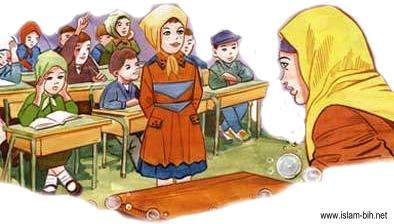
- How
many types of canonical school (madhab) are
there?
- There are
two types.
- How
many founding
imams are there in the schools of faith? What are they?
- There are
two imams. Imam Abu Mansuri Maturidi and Imam Abu Hasan al-Ash'ari, may
Allah be pleased with them.
- How
many schools of Deed are there? What are they?
- There are
four schools of deed. They are the Hanafi, Shafii, maliki and Hanbalii
- What
is your school of faith?
- My school
of faith is Ahli-Sunnah-wal-Jam'aah.
- What
is your school of deed?
- My school
of deed is Hanafi.
- Who
is
the imam of our school of faith?
- Imam Abu
Mansur Muhammad Maturidi is the imam of our school of faith.
- Who
is
the imam of the school of faith of those
who are from the Shafii, Maliki and Hanbali schools?
- Their imam
is Abu'l Hasan al, Ashari.
- Whatis
Fasiq (Impious)?
- It is the name of
a person who is heedless to God’s Commands and prohibitions.
- What is
Fitna?
- It
means a
test
with the good or bad things, moral collapse, social upheaval and chaos.
- What
is Fiqh
(jurisprudence)?
- It is a person’s
knowledge of what
deeds are for his benefit and what are for his harm.
- Would
you please tell us the thirty-two obligatory acts (fardh)?
- Yes:
- 6
pillars of Faith,
- 5
pillars of Islam,
- 12
obligatory acts of prayer
(salah),
- 4
of
minor ablution (Wudhu),
- 3
of
major ablution (Ghusl),
- 2
of
ablution with sand or
earth (tayammum), for a total of 32.
- How
many are the essential principles of faith?
- Six.
- To
believe in the existence of Allah,
- The
Angels,
- The
Divine Scriptures,
- The
Prophets, the Day of Judgement,
- Destiny,
(i.e. that all good and bad comes from Allah)
- How
many basic pillars are there in Islam?
- Five.
- How
many obligatory acts are there in minor ritual
ablution (wudhu)?
- Four.
- Washing
the face from hair end and ear lobes to under the chin
- Washing
the arms up to and including the elbows.
- Wiping
one fourth of the head
- Washing
the feet including the ankles.
- How
many obligatory are there in the major ablution
(ghusl)?
- Three.
- Washing
the mouth with plenty of water
- Washing
inside the nose with plenty of water
- Washing
the hole body without leaving and dry point.
- How
many obligatory acts are there in ablution with
sand and earth (tayammum) if water can not be found?
- Two.
- Intention
for tayammum.
- Hitting
both hands twice on the sand; with the frst wiping the face, with the
second wiping the arms.
- How
many
obligatory acts are there in salah?
- Six internal and six
external,
totally twelve.
Purification
of environment
Purification
from excrement
Covering
private parts
Turning
towards the Kaabah in Makkah (Qibla)
Time
Intention
Opening
salah by uttering the words "Allahu Akbar"
Standing
posture (Qiyam)
Recitng
Qur'an
Bowling
with the palms of the hands touching the knees (ruku)
Prostrating
(sadjah)
Staying
as long as to say "there is only one Allah and Muhammad (s.a.s.) is His
Messenger" in the last sitting position of salah
|